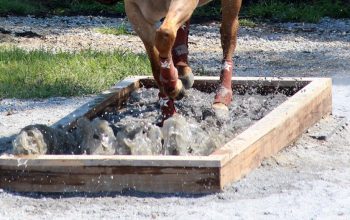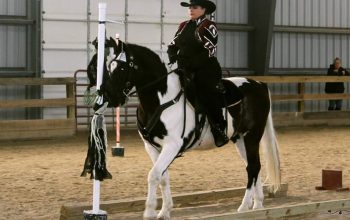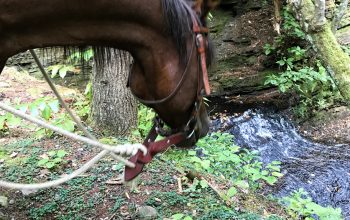Building a Strong Foundation For the Future
By Julie Alonzo

A good judge must have an intimate knowledge of the rules that govern the sport and be able to concentrate and remain professional in high-pressure environments. Judging the sport of Working Equitation is complex. It requires a clear understanding of the technical requirements for correctly performing dressage movements such as 10, 15, and 20 meter circles, halt, rein back, leg yield, half pass, turn on the haunches, walk and canter pirouettes, and flying changes. It demands knowledge of each of the obstacles used in the sport and the criteria by which their performance is evaluated.
One of the ways in which WE United works “for the Integrity of the Sport” was recently illustrated by the week-long intensive Judge Seminar and TD Training the association offered March 14-18 (Judges) and March 19 (Technical Delegates) in Eugene, Oregon. The Judge Seminar was taught by two highly-respected Judges, both members of a very small group licensed by the World Association for Working Equitation (WAWE) to judge the sport internationally. As the international governing body for the sport, WAWE licenses only the highest echelon of judges. António Vicente and Mário Canad Pimentel, both of whom traveled from Portugal to teach the seminar, brought an amazing depth of knowledge and many years of experience judging to the seminar.

The seminar included four days of classroom instruction and 11 hours of live judging practice at a licensed competition with 19 competitors from Introductory through Advanced levels, providing in-depth coverage of the United States Rules for Working Equitation as well as WAWE international expectations for the sport. On the last day of the seminar, Judge Candidates completed a written exam on the rules that included a scoring exercise to demonstrate their proficiency in correctly scoring and placing Working Equitation competitions.

Those in attendance were glowing in their evaluations of the Judge Seminar experience. Jane Renner, who flew in from Colorado to participate, reflected, “The judging seminar hosted by WE United March 13-18, 2017 in Eugene, Oregon was an intensive week of instruction from WAWE judges António Vicente and Mario Canas Pimentel. These two International judges, who have both served as Ground Jury Presidents in the European Working Equitation Championships, not only gave us remarkable insight into the rules of international competition, but also our national rules for USA competitions. They provided refreshing techniques to evaluate and correctly judge the four different trials of Working Equitation.
“The complexities of this sport make it a difficult one to become proficient through the upper levels not only in riding and competing but judging as well. At the beginning of the week I found myself feeling as though I had thrown myself into a raging ocean and barely treading water, however, our instructors and senior judges were diligent and patient and often through humor kept us engaged and encouraged leading us step by step closer to our goals. The power point presentations were methodically delivered in a way that prepared us completely for the enormous amount of information that we were required to retain by the end of the week. At the live judging where we were privileged to judge competitors from Intro through Advanced we were challenged and enthralled to watch Endo the Blind dance gracefully through the courses, as well as young riders and national riders skillfully negotiate the difficult trials with grace, accuracy, and speed.
Commitment and Dedication

“I am thoroughly impressed with WE United’s commitment to this sport in its education of riders and officials. This association’s infrastructure is strong and the leaders are dedicated to develop this sport that is quickly becoming the fastest growing equestrian sport in America into one that will soon have teams competing in Europe. It is easy to recognize the honest drive to preserve the spirit of Working Equitation that WE United and its members possess, and I for one am so grateful to be a part of this group. Thank you so very much for this wonderful opportunity and for so many more yet to come!”
Kim Roe, a Washington state resident who attended the seminar, shared her thoughts at the end of the final day. “The show is over, the exam is finished, and I’ll admit I’m tired. This was a top-notch mind-expanding experience. Our teachers worked to help us understand what good Working Equitation looks like and the essence of the sport.
“One of my favorite quotes came from António,” she reminisced. “‘The judge is not the owner of the truth.’ Meaning judges must be fair, impartial, know the rules, know the standard, but they aren’t perfect.” Kellee Campbell, a participant from Texas, said, “Mário and Antonio are wonderful teachers — informative, patient, and direct while delivering their training with a dose of laughter. This is an absolutely great experience.”
To capitalize on the opportunity for extended learning, WE United conducted the United States’ first official Technical Delegate training for Working Equitation immediately following the Judge Seminar. Nine participants came from Arizona; Oregon; North Carolina; Texas; Alberta, Canada; British Columbia, Canada; and New South Wales, Australia.
Topics included the role and responsibilities of a Technical Delegate and other officials, allowed and prohibited tack and attire, grounds for disqualification and elimination, scoring and placing, and course design and safety considerations.
The next step in the process will be for WE United’s Licensed Officials Committee to review all application materials, exam results, and recommendations, and then interview each candidate for both judge and TD licensure before making their recommendations to the WE United Board. Because of the large number of applicants (26 in all), this process is expected to take a while, but the goal is to have all review and recommendations complete by June 1.
We’re very excited about the quality and knowledge of the people seeking licensure with WE United and look forward to continuing to support them on their journey in the sport.





